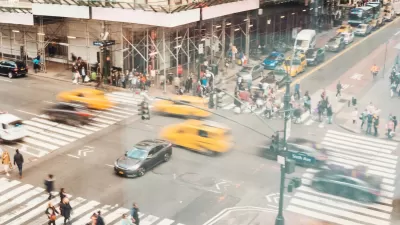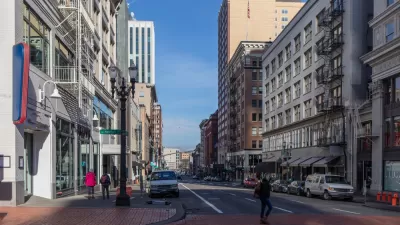The group is tasked with making a deeper assessment of the underlying infrastructural causes of fatal crashes and recommending improvements.

A recently formed Indianapolis city commission seeks to improve the way the city investigates fatal car crashes, reports David Zipper for Bloomberg CityLab. “The commission looks beyond police reports, identifying ways in which street adjustments might reduce the likelihood of another crash and then sharing its recommendations to city leaders as well as the general public.”
The Fatal Crash Review Commission will fill a gap where both local police forces and the National Transportation Safety Board (NTSB) often fall short. “Trained to assign individual blame, police officers may lack the skills or inclination to consider contributing factors like road design,” Zipper explains, while the NTSB focuses its investigations of car crashes on new technology and other precedent-setting situations rather than the thousands of deadly crashes that happen daily on U.S. roads.
As Zipper explains, “After the police complete their investigation, the commission looks for ways in which the built environment may have played a contributing role, considering possible fixes such as adding a pedestrian island or adjusting traffic light signals. Final recommendations are given to the mayor, city council, the chief of police, and the head of the department of public works (which manages roadways).”
The commission’s impact could be confined by its scope, which “is limited to roadway design; crash factors like vehicle features, public health, and law enforcement are outside its purview.” However, advocates hope it can provide a starting point for a deeper understanding of why crashes happen and how to prevent them.
FULL STORY: Indianapolis Gets Serious About Car Crash Investigations

Alabama: Trump Terminates Settlements for Black Communities Harmed By Raw Sewage
Trump deemed the landmark civil rights agreement “illegal DEI and environmental justice policy.”

Study: Maui’s Plan to Convert Vacation Rentals to Long-Term Housing Could Cause Nearly $1 Billion Economic Loss
The plan would reduce visitor accommodation by 25% resulting in 1,900 jobs lost.

Planetizen Federal Action Tracker
A weekly monitor of how Trump’s orders and actions are impacting planners and planning in America.

Waymo Gets Permission to Map SF’s Market Street
If allowed to operate on the traffic-restricted street, Waymo’s autonomous taxis would have a leg up over ride-hailing competitors — and counter the city’s efforts to grow bike and pedestrian on the thoroughfare.

Parklet Symposium Highlights the Success of Shared Spaces
Parklets got a boost during the Covid-19 pandemic, when the concept was translated to outdoor dining programs that offered restaurants a lifeline during the shutdown.

Federal Homelessness Agency Places Entire Staff on Leave
The U.S. Interagency Council on Homelessness is the only federal agency dedicated to preventing and ending homelessness.
Urban Design for Planners 1: Software Tools
This six-course series explores essential urban design concepts using open source software and equips planners with the tools they need to participate fully in the urban design process.
Planning for Universal Design
Learn the tools for implementing Universal Design in planning regulations.
Caltrans
Smith Gee Studio
Institute for Housing and Urban Development Studies (IHS)
City of Grandview
Harvard GSD Executive Education
Toledo-Lucas County Plan Commissions
Salt Lake City
NYU Wagner Graduate School of Public Service





























